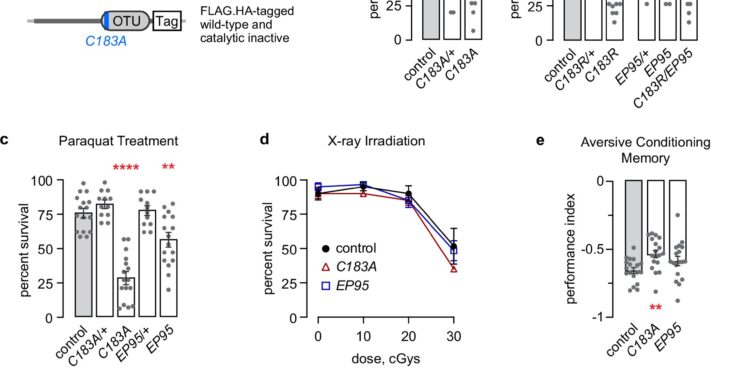OTUD6 promotes resistance to alkylation and oxidation stress. A Drosophila OTUD6 mutations and marked endogenous forms. b Catalytically inactive and loss-of-function mutants of OTUD6 are sensitive to 0.05% MMS exposure, measured at 32 h. Each data point represents the percentage survival in a vial of 15 flies. One-way ANOVA/Dunnett, compared to control. (left: n = 14, 15, 15. right: n = 16, 16, 15, 15, 15, 16). c Catalytically inactive and loss-of-function mutants of OTUD6 are sensitive to 10 mM paraquat exposure, measured at 72 h. One-way ANOVA/Dunnett, compared to control.n = 16, 12, 12, 12, 16) d. Survival of third-stage larvae exposed to X-ray irradiation. (n= 3, 3, 3). And Pavlovian short-term memory of aversive shock-neutral odor pairing. One-way ANOVA/Dunnett, compared to control.n= 18, 18, 18). F OTUD6 is uniformly distributed in the Drosophilabrain. Left: OTUD6.FLAG.HA detected with anti-HA (green). Right: unlabeled wild-type control. Scale bar: 50 μm. G Distribution of endogenously labeled OTUD6 (left) and OTUD6C183A (right) in the ovarian chambers. The large nuclei and surrounding cytoplasm in the center are nurse cells surrounded by smaller follicular cells. Scale bar: 25 μm. Data are presented as mean values +/- SEM. Points on bar graphs and n represent biological replicates. Source data and statistics are provided as a source data file. Credit: Nature Communications(2024). DOI: 10.1038/s41467-024-51284-y
UC Merced researchers have used fruit flies to uncover a cellular process common to many organisms that could have a profound impact on understanding cancer and aging.
Professor Fred Wolf of the Department of Molecular and Cellular Biology, Sammy Villa, then a graduate student, and Vishva Dixit, vice president and senior scientist of physiological chemistry and research biology at Genentech, discovered a mechanism that cells use to adjust the amount of proteins they produce through the process of translating RNA into proteins.
“This mechanism could be responsible for changes in protein translation during stress, cancer and aging,” Wolf said.
Their work is detailed in the journal Communication about nature.
Wolf and Dixit have a working relationship that dates back to when Wolf was an undergraduate and technician in Dixit’s research lab at the University of Michigan. They stayed in touch after Wolf went to graduate school at Berkeley and Dixit joined Genentech, a Roche company and a pioneer in the biotech industry.
“Vishva knew I was an expert in fruit fly genetics, a resource that wasn’t available at Genentech,” Wolf said. Normally, Wolf’s lab focuses on understanding the brain circuits and genes that control animal behavior, particularly how alcohol affects the brain and how motivation is mapped there.
He and his researchers use fruit flies, a popular choice among researchers because they are inexpensive to use, reproduce quickly and abundantly, and their genetics are easy to modify to test ideas. Research focused on the fruit fly has yielded many sophisticated tools, Wolf said.
But Dixit wanted to understand the function of the OTUD6 protein.
“He asked us to use the awesome power of the fly model to uncover its function, and we rose to the challenge,” Wolf said. “The project really got going when the paper’s first author, Sammy Villa, joined my lab in 2018. Sammy took charge of the project, and his skills in molecular biology and biochemistry were instrumental to the project’s success.”
At first, the researchers had no idea what they were looking for. When they first created flies mutant for the OTUD6 gene, they expected to see something obvious, like the shape or number of wings or reproductive abnormalities. Instead, the flies looked normal.
“We subjected the flies to as much stress as possible and found that they were sensitive to chemical stress, for example oxidative stress,” Wolf said. “This allowed us to investigate how OTUD6 contributed to stress resilience.”
The researchers studied all the proteins that interact with OTUD6 to find out what it does and found that it cuts protein production from ribosomes in half. This change allows cells to produce more proteins.
“We were very surprised by the dramatic impact of OTUD6 on the amount of protein produced in cells: the OTUD6 mutant flies reduced protein production by half. That’s a big difference,” Wolf said. “It’s known that the amount of protein produced in cells affects the lifespan of animals, with less protein production correlated with longer lifespan. Our OTUD6 mutants lived twice as long. We think this is because there’s less protein being produced.”
The amount of protein generated can also have a huge impact on certain types of cancers.
Some types of OTUD6 in humans are present in increased levels in many cancers, and many cancers have increased production of the protein. The researchers stressed that they had no direct evidence of a link, but that increased OTUD6 could contribute to the growth and proliferation of cancer cells.
Cells can change their amount of OTUD6 to change the amount of protein produced.
“It’s been known for years that there are two other ways cells actively regulate the amount of proteins they produce, and we think we’ve discovered a third way,” Wolf said.
The team wants to find out how the cell changes the amount of OTUD6 present in cells, which could help understand how this new pathway is initiated and could lead to new ways to manipulate protein production to positively affect lifespan and perhaps even cancer outcomes.
More information:
Sammy Villa et al, OTUD6, RPS7/eS7 deubiquitination on the free 40S ribosome regulates global protein translation and stress, Nature Communications(2024). DOI: 10.1038/s41467-024-51284-y
Provided by University of California – Merced
Quote:Drosophila study uncovers mechanism that could control longevity and cancer cell production (2024, September 3) retrieved September 4, 2024 from
This document is subject to copyright. Apart from any fair dealing for the purpose of private study or research, no part may be reproduced without written permission. The content is provided for informational purposes only.



